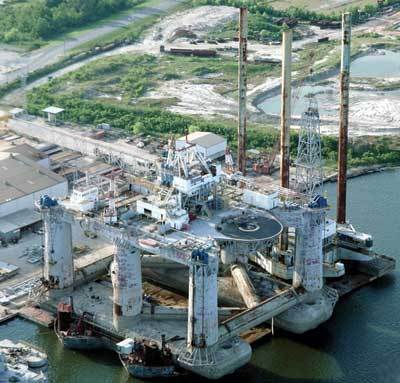Podcast: Play in new window | Download
Updates:
- Federal appeals court orders a new sentencing hearing for Mumia Abu-Jamal
- CCR Says Guantánamo Leaks Must Be Met By Release of Obama Task Force Assessments
- Memorial for Leonard Weinglass Friday May 13 At the New York Ethical Culture Society
—-
In what may be the largest human trafficking case in US history, Indian guest workers are suing Signal International for human trafficking ad racketeering. Several law firms filed the lawsuit on behalf of seven plaintiffs representing 500 formers guest workers lured into the US after Hurricane Katrina. The guest workers were subjected to racial discrimination, forced labor and other abuse.
Signal is a multi million dollar marine fabrication company with shipyards in Mississippi, Texas and Alabama. They repair and build oil rigs and ships and subcontract with the Dept of Defense and multinational companies. After Hurricane Katrina, Signal’s workforce scattered and they used the government’s guest worker program to import employees as welders and pipe fitters. Between 2004 and 2006 hundreds of Indian men were paid up to 20 thousand dollars each for travel, visa and other fees after being told it would lead to good jobs and permanent US residency.
When the men arrived at Signal they discovered they would not receive green cards, but instead were given 10-month guest worker visas. Signal forced the men to pay $1,050 a month to live in overcrowded, unsanitary and racially segregated labor camps with no visitors allowed. To talk more about this case, we’re joined by Chandra Bhatnagar is a Staff Attorney with the Human Rights Program and Sabulal Vijayan, a former guest worker involved in the lawsuit.
- Signal used the opportunity of the storm to seek out new labor pools. Signal in partnership with an American labor broker, an American Immigration lawyer and an Indian recruiter, conspired to bring in a group of 500 men from India as H2B guest workers.
- The workers were promised green cards, permanent residency, and the opportunity for long term jobs.
- Sabulal Vijayan: I was working in the middle east, the United Arab Emirates, I saw the ad by Signal that said we would get permanent residency in America. I paid about 18 thousand dollars, I cut my wrists in fear, I tried to kill myself because I spent a bunch of dollars. I was in the hospital for 3 days. I couldn’t go back to my family in India with bare hands, because I spent all the money on this job. Not only me but 500 workers, sold all their land and houses for this job.
- The EEOC, brought a separate lawsuit against Signal, alleging racial and national origin discrimination and hostile work environment.
- Because Sabulal was one of the workers seeking his rights under the law, he was particularly targeted by Signal and rounded up in an early morning raid. The camp was built on a lead contaminated waste site.
- It’s not OSCHA compliant to have 24 guys jammed together in a temporary trailer.
- These are in the United States and in debt. The average income in India is 3000 dollars a year for a ship worker. To pay 20 thousand dollars, you have to sell your property, borrow money from loan sharks. You have to mortgage your whole life for the opportunity to come here. Signal also said if you file a lawsuit, we’ll send all of you back.
- Signal is a marine fabrication company, a multi-million dollar company. They repair and build oil rigs and ships. They have yards in Mississippi, Alabama and Texas. They provide services to the Department of Defense and major corporations.
- It was a conspiracy between the Immigration lawyer, the Indian recruiter, the labor broker and Signal.
- Signal got this vulnerable pool of workers who they could throw away whenever they wanted to.
- You don’t have freedom of contract as a guest worker, you’re the disposable property of the employer.
Guest – Chandra Bhatnagar, ACLU Staff Attorney with the Human Rights Program. He leads the domestic and international advocacy around racial profiling, affirmative action, and juvenile justice issues, and is engaged in federal court litigation and litigation in international tribunals involving the rights of low-wage immigrant workers, undocumented workers, and guest-workers.
Guest – Sabulal Vijayan, guest worker from India, who is involved in the case. Sabulal, a pipefitter, paid nearly 20 thousand dollars to work in the United States as a guest worker. He worked with others in slave labor-like conditions for Signal International.
———–
Professor John Ehrenberg: Class Warfare Update and Analysis
Returning guest, professor and author John Ehrenberg joins us in the discussion of where the last 3 years the Obama Administration has led the country. The United States is pouring trillions into multiple war theaters, unemployment continues to rise, CEOs of banks and corporations have been rewarded with taxpayer bonuses and bailouts, and a massive unequal distribution of wealth has polarize the country. Meanwhile, the very rights that protect organized labor and the benefits of workers are attacked and disassembled during one of the worst economic downturns to hit the United States. Corporations and the far right wing of the Republican Party are behind some of the union busting yet even President Obama turned his back on supporting union labor demonstrations. Most recent show with John Ehrenberg
- The elephant in the room that nobody talks about is the role of the state and the role of the government.
- Winner-Take-All Politics: How Washington Made the Rich Richer–and Turned Its Back on the Middle Class
- What you had since the 1980s is a policy pushed by the Republicans and acquiesced by the Democrats of undoing the Great Society. We’ve seen this in the union busting and refusing to tax the rich. It’s been happening because the Republican party is getting more radical.
- The villan in the room is governmental and fiscal policy.
- The top 1 percent of the population received more than a third of all the wealth created in the country from 1979 to the beginning of the recession. The top 1/10 of one percent, that’s one out of every thousand households, received over 20 percent of all the after tax gains between 1979 and 2005.
- It was a conscious policy. It began in the late 70s by business. If you look at the neo-conservatives of that period, their target is the Great Society.
- Basically in the late 60s and the early 70s, the traditional stimulus programs of the Democrats failed.
- Along comes Reagan and he takes on a radical restructuring of the economy.
- Which began this process of shoveling huge amounts of wealth to the rich, hoping that it would trickle down and you’d have sustained growth.
- Consider that Obama is going to raise a billion dollars for his reelection campaign. Where is he going to get it from?
- Look, anybody at this stage of the game who continues to trust the Democratic party to lead the country out of this mess, is a fool.
- The Democratic Party by itself is incapable of democratic initiative and progressive change unless forced to respond from pressure from outside.
- When do they have enough? The answer in 1100 pages of Capital: A Critique of Political Economy is it’s never enough. That the logic of capital is to reduce everybody to starvation and take everything they have.
- This is the motor of the system, this has nothing to do with the Koch Brothers.
- Hopefully people are tired of being pushed around. American exceptionalism, meant that Americans were more tolerant of inequality, than were people from a stronger labor tradition.
- That American’s didn’t care so much if other people got rich as long as they got rich too.
- If you have a situation where Americans are misinformed about the distribution of wealth and are open to appeals to redistribute wealth in the name of fairness and equity, then this is the time for a redistributus Democratic party to step forward.
- If the Democratic Party is even a modicum of sanity in America, it’s because its going to have be pushed again. Pushed and pushed and pushed from outside.
- 55 percent of Republicans want higher taxes on the rich.
- There are local manifestations of outrage and rebellion, in Wisconsin, Indiana, Ft Lauderdale, around different aspects of the mal-distribution of wealth. – but nothing has been coordinated on the national level.
- There are as yet, no forces talking about the system as a whole, as a state.
- There are a lot of indications across the board that people have had enough.
- Go out there and join something and get involved.
- UNICEF publication. The Children Left Behind. Indices: Health, Education, Material Well Being. The United States is last of the 24 countries.
- If you look at the fall of any of the world’s empires, it was a combination of the over reach and the refusal of the rich to pay their share of taxes.
Guest – John Ehrenberg, author of Servants of Wealth, The Rights Assault on Economic Justice, he’s also professor of political science at Long Island University.
————————————————————————-



